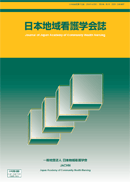Volume 21, Issue 1
Displaying 1-8 of 8 articles from this issue
- |<
- <
- 1
- >
- >|
Original Article
-
2018 Volume 21 Issue 1 Pages 4-13
Published: 2018
Released on J-STAGE: April 20, 2019
Download PDF (1074K)
Research Reports
-
2018 Volume 21 Issue 1 Pages 14-22
Published: 2018
Released on J-STAGE: April 20, 2019
Download PDF (1048K) -
2018 Volume 21 Issue 1 Pages 23-31
Published: 2018
Released on J-STAGE: April 20, 2019
Download PDF (1068K) -
2018 Volume 21 Issue 1 Pages 32-39
Published: 2018
Released on J-STAGE: April 20, 2019
Download PDF (1072K) -
2018 Volume 21 Issue 1 Pages 40-49
Published: 2018
Released on J-STAGE: April 20, 2019
Download PDF (1154K)
Informations
-
2018 Volume 21 Issue 1 Pages 50-55
Published: 2018
Released on J-STAGE: April 20, 2019
Download PDF (1103K) -
2018 Volume 21 Issue 1 Pages 56-62
Published: 2018
Released on J-STAGE: April 20, 2019
Download PDF (1003K) -
2018 Volume 21 Issue 1 Pages 63-69
Published: 2018
Released on J-STAGE: April 20, 2019
Download PDF (994K)
- |<
- <
- 1
- >
- >|
